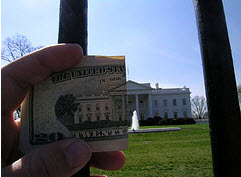White House: Free Market Isn't "Free License To Take Whatever You Can Get"

(zieak)
The White House has released potions of a speech to be made by the president later today in NYC. In it Mr. Obama calls on banking industry lobbyists to halt their efforts to stop financial reforms that he feels are in the best interest of the market and the country.
Here is the excerpt, from USAToday:
One of the most significant contributors to this recession was a financial crisis as dire as any we’ve known in generations. And that crisis was born of a failure of responsibility — from Wall Street to Washington — that brought down many of the world’s largest financial firms and nearly dragged our economy into a second Great Depression.
I am sure that many of those lobbyists work for some of you. But I am here today because I want to urge you to join us, instead of fighting us in this effort. I am here because I believe that these reforms are, in the end, not only in the best interest of our country, but in the best interest of our financial sector. And I am here to explain what reform will look like, and why it matters.
A comprehensive plan to achieve these reforms has passed the House of Representatives. A Senate version is currently being debated, drawing on the ideas of Democrats and Republicans. Both bills represent significant improvement on the flawed rules we have in place today, despite the furious efforts of industry lobbyists to shape them to their special interests.
It was that failure of responsibility that I spoke about when I came to New York more than two years ago — before the worst of the crisis had unfolded. I take no satisfaction in noting that my comments have largely been borne out by the events that followed. But I repeat what I said then because it is essential that we learn the lessons of this crisis, so we don’t doom ourselves to repeat it. And make no mistake, that is exactly what will happen if we allow this moment to pass — an outcome that is unacceptable to me and to the American people.
As I said two years ago on this stage, I believe in the power of the free market. I believe in a strong financial sector that helps people to raise capital and get loans and invest their savings. But a free market was never meant to be a free license to take whatever you can get, however you can get it. That is what happened too often in the years leading up to the crisis. Some on Wall Street forgot that behind every dollar traded or leveraged, there is family looking to buy a house, pay for an education, open a business, or save for retirement. What happens here has real consequences across our country.
The administration also has on their website an outline of what financial reforms they support and why.
“Relying on market discipline to compensate for weak regulation and then leaving it to the government to clean up the mess is not a good strategy for economic growth nor financial security,” reads the post.
According to the White House the goals of these proposed reforms include:
* Clearer accountability in supervision and regulation so that financial firms can operate under a coherent set of rules and expectations without the current regulatory arbitrage opportunities that allow some firms to “game the system.”
* Stronger capital buffers to increase the ability of financial companies to weather the ups and downs of financial markets.
* Lesser concentration of risk among the largest financial firms so that any one firm can fail without creating a domino effect throughout the entire financial system that jeopardizes jobs, family savings and the entire economy
* Greater transparency in the derivatives market that will make the system safer by providing regulators with the data they need to manage systemic risk and help ensure the integrity of financial markets so we can prevent future AIG-like disasters.
The speech can be viewed live here at 11:55 EDT.
Obama: ‘Free market’ is not a ‘free license’ [USAToday]
Wall Street Reform [White House]
Want more consumer news? Visit our parent organization, Consumer Reports, for the latest on scams, recalls, and other consumer issues.

